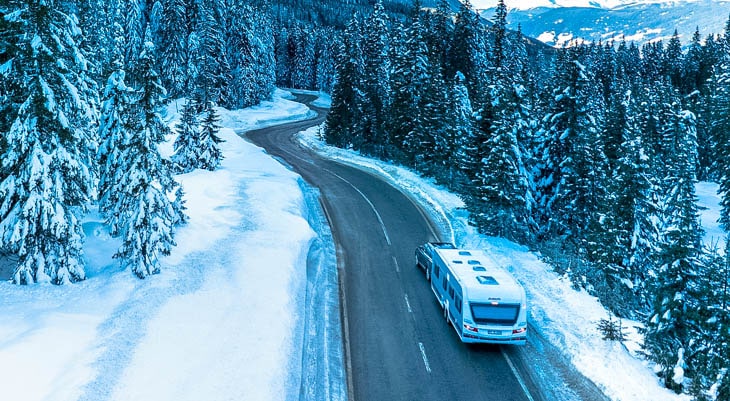Jos Mark
PublisherJos has been camping from a young age. Nowadays, he travels with his wife Ineke and their dog Noa in a Carthago C-Tourer 145 RB LE motorhome.

Snow-covered landscapes, crisp mountain air, and cozy evenings in your camper or caravan—winter camping isn’t such a crazy idea. But is your vehicle ready for freezing temperatures? What’s the difference between winter-ready, winterproof, and winter-hardy? And what can you do to make your winter adventure even more comfortable?
From fun in the snow-covered mountains to peaceful hikes in nature without the crowds, winter camping is a completely different experience from summer camping. However, not every camper or caravan is suited for winter conditions. Terms like winter-ready, winterproof and winter-hardy indicate how well your vehicle can withstand the cold—but what exactly is the difference?
A camper or caravan that is winter-ready can be used in cold temperatures, even for winter sports trips. However, you’ll need to take some precautions to ensure a truly comfortable experience. You can read more about these further in this article.
Winterproof and winter-hardy mean the same thing. German manufacturers use the term “winterproof,” while non-German manufacturers prefer “winter-hardy.” If your camper or caravan is labeled as such, it means it is designed to withstand extreme cold. In many cases, winterproof campers have a double floor for extra insulation.
Manufacturers can’t just label their vehicles as winterproof or winter-hardy without meeting strict requirements. Campers and caravans must pass rigorous tests, including how quickly the interior warms up in freezing temperatures, whether water tanks and pipes resist freezing, and how well the vehicle is insulated.
Are you planning to go winter camping more often? Then choose a model specifically designed for cold conditions. Scandinavian manufacturers like Kabe and Polar are a great choice, as they produce extremely winter-hardy vehicles as standard.
Other brands, such as Dethleffs and Adria, offer additional winter comfort packages or have a few winter-hardy models in their lineup.
You can, of course, take steps to make your camper or caravan winterproof yourself. For example, always ensure you have enough gas, especially on cold nights. A smart solution is installing a Truma Duocontrol. This system automatically switches from an empty gas bottle to a full one, so you never run out of heat. Additionally, consider a Truma heating system with electric auxiliary heating, such as a Combi E or Ultra Heat.
Extra protection against the cold is essential. Install vent covers on your fridge vents to keep cold air out. An indispensable addition is the EisEx, a small heating element that prevents your gas pressure regulator from freezing. If you’re going winter camping, make sure to have a chimney extension so your exhaust doesn’t get blocked.
For additional insulation, you can use thermal mats to protect your windows from the cold. Don’t have underfloor heating? Heating mats that fit under your existing carpet provide an excellent solution. They are easy to operate via a timer or thermostat and make your camper or caravan much more comfortable during winter conditions.
A good preparation prevents many winter problems. Make sure that winter tires are mounted on the towing vehicle and bring snow chains. Practice putting on the chains at home in advance so you won’t face surprises on the road. Before driving, ensure that the roof of your camper or caravan is free of snow.
Once at your destination, be mindful of where you park. Trees with a heavy layer of snow pose a risk. If the snowpack falls, it could damage roof hatches, for example. To prevent stabilizer jacks from freezing to the ground, place extra planks underneath them. Check daily that your power cables are not lying in the snow to avoid them freezing. Also, it is wise not to use the handbrake but instead place wheel chocks.
And if you don’t want your clothes to freeze to the outer wall, make sure to leave space between your clothes and the wall when storing them in the upper cabinets. If your vehicle is not winterproof, condensation can form in the cabinets, causing your clothes to freeze. You can also prevent this by leaving the cabinet doors slightly open.
Finally, we have one last piece of advice: enjoy! With the right preparation, winter camping is an unforgettable experience. Drink hot chocolate or mulled wine after a long winter walk and experience the magic of a snowy landscape from your own camper or caravan. Have fun!
Spotted an error? Email us. We appreciate it!